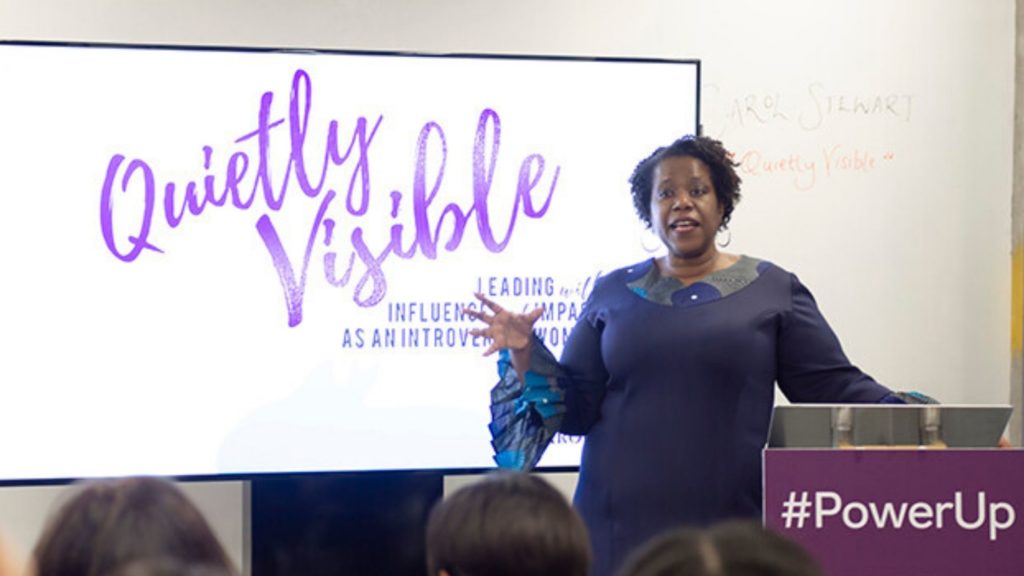At the launch for my book Quietly Visible: Leading With Influence and Impact as an Introverted Women, I facilitated a panel discussion with Sasi Panchal, Dienaba Forfana, Susan Heaton-Wright and Helena Thernstrom, 4 introverted women who are all achieving great things, and had all overcome barriers and challenges to do so.
We discussed whether introvert bias was a myth or a reality and you can watch the full discussion here.
I asked the panel whether they had been treated less favourably because of their introversion or whether they knew anybody that had. Sasi talked about a situation where the organisation was going through a restructuring and at a meeting with a new leader, she was not feeling well. She was quiet and did not speak much. This had a detrimental effect on her performance ratings.
Having their performance judged based on how much they speak up at meetings is something that many introverts experience. I mentioned a woman who had contacted me to say her manager had told her she wanted to have a chat with her about her confidence issues. This woman did not have confidence issues. It was that her quiet nature was being mistaken for a lack of confidence.
Childhood experiences
Dienaba shared her experience of being from a Senegalese background and having been raised in France. She grew up in a family where her parents always told her they needed to adapt. And that she needed to be outgoing with big gestures to get the job she wanted. Something she strived to do.
She began to realise that she needed time to think and reflect in meetings. She didn’t like to speak just for the sake of it. She prefers to think a bit deeper and to add value. She was told by a manager that her work was good, but she needed to be more outgoing. She started to work on that and called herself a trained extrovert.
She recognised when she needed time alone to think and reflect, and when doing so, doesn’t want to talk to anybody. That is how she gets energised. This was when she started to realise that she was more on the introverted side of the spectrum.
Susan went to a highly competitive girls’ school and when thinking about applying to go to university, was told by her form mistress that she wasn’t good enough because she didn’t speak up enough in class.
She wasn’t going to support Susan’s application for university, but Susan was determined and insisted to the headmistress that she wanted to apply. She applied and was offered places at the top universities. The headmistress told Susan that she had a quiet strength.
Helena spent part of her childhood in a finishing school in France. As a Swedish national, French was not her first language and she had to take many oral exams. As a foreign national, not only did she struggle with the language and the cultural difference, she also struggled with being introverted.
This was quite a traumatic part of her childhood, and the experience made her think that she wasn’t very good at thinking and speaking on the spot.
Meetings and other things
We talked about the way most meetings are conducted and the panel shared their views about how introverts experience them. Sasi mentioned how in virtual meetings it can sometimes take a lot for the facilitator to be on guard and take perspectives of who’s not contributing. It takes a lot of empowerment sometimes to go back and speak one on one to the individuals who haven’t contributed.
They could have some great ideas but not shared in the forum together. What tends to happen is someone has a great idea outside the meeting, you talk about it, go back to the meeting and whoever is the extrovert takes it on as their idea and gets the credit for it. Meetings need to be more equitable.
Dienaba talked about how there are a lot of introverts in her team so in order that everyone feels they can contribute, will let people know in advance the topics she wants them to speak on. She mentioned having been in situations where she’d had an idea and somebody took her idea and went with it, getting mad at herself for not saying anything. She makes sure that when she organises meetings, she gives everyone an opportunity to have a say.
Susan talked about meeting agendas being sent out in advance, and introverts preparing for them and challenging themselves to speak up. Also, for facilitators to be aware of the differences in the room.
Helena expressed her concerns about how technology and the fast pace of things means agendas and papers are not always sent out in advance. She coaches introverts within the women’s network of her organisation on how to make life easier for themselves, because others are not always going to be so considerate.
We talked about interviews and why these can be challenging for introverts, and how the way in which some job descriptions are written can be off putting. We concluded with the panel sharing their thoughts on whether introvert bias was a myth or reality. And discussed how organisations can address unfavourable introvert bias, and what introverts can do if they face it. Watch the video for the full discussion.
What about you? Do you think introvert bias is a myth or a reality? Share your views in the comments and let’s continue the discussion.

